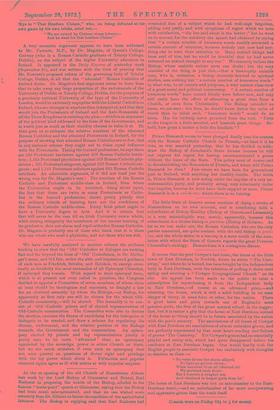A very eccentric argument appears to have been addressed to
Mr. Fawcett, M.P., by Dr. Maguire, of Queen's College, Galway (who is a Roman Catholic graduate of Trinity College, Dublin), on the subject of the higher University education in Ireland. It appeared in the Daily Express of yesterday week (September 20), and was written with the view of proving that Mr. Fawcett's proposed reform of the governing body of Trinity College, Dublin, is all that the " educated " Roman Catholics of Ireland desire. Dr. Maguire's first argument seems to have been that to take away any large proportion of the endowments of the University of Dublin or Trinity College, Dublin, for the purposes of a genuinely national University of the type of the University of London, would be extremely unpopular with the Liberal Catholics in Ireland, who are stronger in numbers than is suspected, and that they would join the Protestants of Ireland and the Anti-Romanists of all the Three Kingdoms in resisting the plan ; —which is an argument of the political kind addressed to the fears of the Government, and is worth just as much as their timidity chooses to value it at. He then goes on to estimate the relative numbers of the educated Roman Catholics and the educated Protestants in Ireland, for the purpose of showing that educated Roman Catholics are so few, that in any national scheme they ought not to claim equal influence with the Protestants. Taking the learned professions, he says there are 526 Protestant barristers against 208 Roman Catholic barns- -tore; 1,165 Protestant physicians against 539 Roman Catholic phy- sicians; 531 Protestant surgeons, against 222 Roman Catholic sur- geons; and 1,164 Protestant solicitors against 665 Roman Catholic solicitors. An admirable argument, if it did not tend just the wrong way for Dr. Maguire's case ! The numbers of the Roman Catholic and Protestant middle-class in Ireland, from whom the Universities ought to be recruited, being about equal, the fact that there are twice as many Protestants as Catho- lics in the learned professions, shows pretty plainly that the ordinary schools of learning have not the confidence of the Roman Catholic middle-class. Every Irish priest ought to have a University degree in Arts. And it is certain that that will never be the case till an Irish University exists which, while testing stringently the soundness of the secular learning of its graduates, does not alarm and repel orthodox Roman Catholics. Dr. Maguire is probably one of those who think that it is those who are whole who need a physician, and not those who are sick.


































 Previous page
Previous page